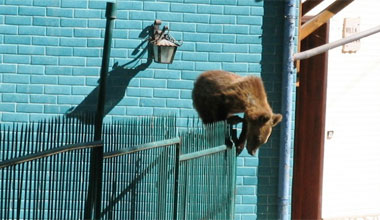During the course, organized by the Autonomous Region of Friuli Venezia Giulia in collaboration with the State Forestry Corps, experiences with confident bears in various Italian territories will be compared.
A refresher course is taking place these days on issues related to the management of so-called confident / problematic bears, organized by the Autonomous Region of Friuli Venezia Giulia in collaboration with the State Forestry Corps as part of the Life “ARCTOS” project of which both institutions are partners. The Life “ARCTOS” project is an initiative aimed at encouraging the protection of the populations of brown bears (Ursus arctos) in the Alps and Apennines and to support their numerical expansion, through the adoption of management measures compatible with the presence of the plantigrade, the reduction of conflicts with human activities, information and awareness. The project is implemented under the programme financed by the European Commission LIFE + Nature.
A refresher course, scheduled from November 27 to 29 at the Service Centre for forests and mountain activities (CESFAM) of Paluzza (UD), is directed to personnel from Friuli Venezia Giulia (Regional Forestry Corps, Provincial Police and State Forestry Corps) and Veneto (State Forestry Corps) and aims at systematizing all the procedures adopted in different geographical areas, treasuring the best practices in order to perform the best conservation of the species on the whole national territory. The course will continue and extend many of the topics discussed during the July 2011’s meetings at the Forestry Corps School in Cittaducale that led to the qualification of operators in charge of managing emergency related to the presence of confident / problematic bears in different areas, as codified by the LIFE action C4, whose national coordination is provided by the State Forestry Corps itself.
The action C4 contemplates two different operative “lines”: creation of first intervention teams for the management of problematic bears and the coordination of these activities either in Alpine or Apennines areas. Among the key goals of the course there is the need to ensure professional development in some technical activities such as the use of weapons supplied to the personnel responsible for activities of deterrence of those problematic specimens, through shooting range activities by the shooting instructors of Cittaducale CFS School. Together with operational aspects, issues of a regulatory nature will be dealt as well (such as animal welfare, veterinary and some techniques of bear capture and monitoring) and communicative aspects, as the role played by communication is of great importance either for relations between the operators and different local stakeholders or concerning the use of the bear by the media in a broad sense.
Different experiences in the management of specimens classified as “confident” or “problematic” in different bear populations in Italy will also be compared as part of the course. In particular, the cases in Trentino, where the bear was reintroduced in the late 90’s and where even dogs were used in support of bear deterrence, and Abruzzo, where the bear population has interacted with the local people, will be compared. And finally the experience of the National Park of Abruzzo, Lazio and Molise, where the State Forestry Corps and the Park Authority have cooperated in creating teams of operators qualified in deterrence, technical issues and organizational aspects that involve different governments responsible for that area will also be compared.
From the press office of the State Forestry Corps General Inspectorate
(http://www3.corpoforestale.it/flex/cm/pages/ServeBLOB.php/L/IT/IDPagina/5951)


